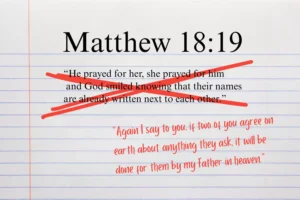Sitting across the table from my 96-year-old great-grandmother is always a joy. It doesn’t take long to realize she was once a fiery redhead, even beneath the faded beauty.
She smiles wide when I tell her that I’ve decided to be a pastor. I smile back.
See, my great-grandma grew up in a small town in Illinois, went to Bible school and married a pastor. She and my great-grandfather served in churches from Mississippi to Maryland. Her stories range from the hilarious to the somber and depressing.
I took a sip of my tea as she told me another funny story with that twinkle in her eye.
When she finished her story, I couldn’t help but ask her about the hard times. Her face darkened as the months and years of difficulty and sorrow flashed through her mind. Their house had burned after a church service. I could imagine my great-grandmother being dragged away from the wreckage as she watched through tears all that she owned burn to the ground.
“But you know what, Tim? It couldn’t have been better for us,” she told me. “We kept serving, and that tragedy brought us closer to the community. We ended up in an even better house.”
Hardly anyone knows my great-grandmother. She does not command attention when she enters a room. She is frail and forgetful. But I wouldn’t dare for a moment say that this woman was not used by the Lord in incredible ways.
She stands as a spiritual giant in my mind, despite her lacking résumé and speaking schedule.
The Apostle Paul tells us in 1 Corinthians 1:27 that “God chose the foolish things of the world to shame the wise; God chose the weak things of the world to shame the strong. He chose the lowly things of this world and the despised things — and the things that are not — to nullify the things that are so that no one may boast before him.”
Paul wraps up his thought by saying, “Let him who boasts, boast in the Lord.” That’s too often not my mentality, which usually begins with God using big people for big things. Francis Schaeffer noted that our thought pattern is often, “It is wonderful to be a Christian, but I’m such a small person, so limited in talents — or energy or psychological strength or knowledge — that what I do is not really important.”[note]Schaeffer, Francis, No Little People, Crossway, 2003, pg. 25.[/note]
It’s not true.
Faithful to the End
On Dec. 4, 2006, Pfc. Ross McGinnis’ platoon had been ordered to enter back into one of the most dangerous neighborhoods in Baghdad after having just returned from a three-day patrol. As the convoy entered the neighborhood, the men in McGinnis’ Humvee heard a “tink” sound.
“Grenade!” McGinnis yelled. “It’s in the truck!”
“There was only about two seconds for everybody to get out,” his superior officer Sgt. Thomas recalled. “I had a full vehicle that day, so there were a total of five of us in the Humvee. There was no way we were all getting out.”
Thomas remembers McGinnis standing “as if he were swatting the grenade away.” The 19-year-old private then “leaned on the grenade, pushing his back up against it. When it detonated, his body shielded the rest of us from the blast,” Thomas said.
The other soldiers in the Humvee quickly poured out of the vehicle, not realizing until later that McGinnis was dead.
“Without his sacrifice, I would not be here today,” Thomas said.
In recognition of that sacrifice, the family of McGinnis was given the Medal of Honor on June 2, 2008.[note]Holbert, Tim, Washington Times, “Behind the Medal of Honor,” Thursday, May 28, 2009.[/note]
McGinnis didn’t do his job because he wanted fame. He did it because he was faithful to the very end. True greatness most shows itself not in the grandeur of lights, but in the obscure thickness of the battlefield.
I think of my great-grandmother in the same way I think of McGinnis and other heroes. They didn’t start their days as heroes, but they ended their lives that way. God doesn’t ask for anything more from us than faithfulness.
I struggle a lot with this concept. I can go to work and feel like I’m completely wasting my time. My heart has lots of dreams. I want to really make a change in the world. I want to impact people. But sitting at a desk job or standing behind a counter doesn’t seem to do anything to turn the tide in the culture around me.
I feel useless.
I look at men like McGinnis who sacrifice themselves on the battlefield, or men who stand up in front of thousands and preach sermons that leave me shaken and think that this is what God wants me to do.
Serving Chicken
There was a time in my life when I was working at a fast-food chicken restaurant, serving customer after customer, and despite my best efforts, I was burning out. Handing out chicken sandwiches to moms with their whiny kids and construction workers with grimy hands wasn’t making a true difference in the world.
That’s when my store’s owner sat down with me one day, and we began to talk about his journey through Chick-fil-A over the years. Mike had started as a young teenager just like me, working one day at a time. He always did his best, going the “second mile” as Christ had instructed us. Year after year, sometimes and mostly without any kind of recognition or promotion, he clocked in and served his customers, and he built strong relationships with the team members around him. Mike told me I had the opportunity to do the same thing: I could make a difference for Christ where I was. I could talk to thousands of customers and hundreds of team members over time just like many men have the special opportunity to speak to thousands on the weekends at conferences or in their books. I just needed to be faithful with what the Lord had given me (see Matthew 25:14-30.)
I was inspired by Mike’s words to me. I thought that Jesus wanted a book or new engaging message for my generation.
But all He wants from me is faithfulness.
I’m Diving In
If we do not love Christ supremely, we do not love Him at all. Faithfulness is an all-in, total surrender type of action. It is the call of Christ on each life: “Sell your possessions and give to the poor, and you will have treasure in heaven. Then come, follow me” (Matthew 19:21, NIV). We must be willing to lose it all, push all distractions aside, to remain faithful to the Lord right where we’ve been placed by His sovereign will.
When the house burns to the ground, we are faithful. When that phone call comes, we remain faithful. When we receive the promotion at work, we remain faithful. Through the tears, the laughter, the joy, the pain, we lean totally and completely on the One who will never leave us nor forsake us.
And when that day comes, as any beauty left on our faces is consumed by wrinkles and blemishes, we will raise our hands and worship, an example to the next generation of believers who are walking behind us.
Kevin DeYoung sums up the message that I need to hear so well in his article “The Glory of Plodding Visionaries“:
We have dreams of changing the world, and the world should take notice accordingly. But we’ve not proved faithful in much of anything yet. We haven’t held a steady job or raised godly kids or done our time in VBS or, in some cases, even moved off the parental dole. We want global change and expect a few more dollars to the ONE campaign or Habitat for Humanity chapter to just about wrap things up.
What the church and the world needs, we imagine, is for us to be another Bono — Christian, but more spiritual than religious and more into social justice than the church. As great as it is that Bono is using his fame for some noble purpose, I just don’t believe that the happy future of the church, or the world for that matter, rests on our ability to raise up a million more Bonos (as at least one author suggests) … Until we are content with being one of the million nameless, faceless church members and not the next globe-trotting rock star, we aren’t ready to be a part of the church.
What we need are fewer revolutionaries and a few more plodding visionaries. That’s my dream for the church — a multitude of faithful, risk-taking plodders. The best churches are full of gospel-saturated people holding tenaciously to a vision of godly obedience and God’s glory, and pursuing that godliness and glory with relentless, often unnoticed, plodding consistency.
When I stood to leave my great-grandmother that day, I imagined my own life, stretching out like a long highway in the desert. I could see in the distance some hills, mountains and rough terrain. Most of it was hidden. But what I could see was right around me, in all its glory and splendor. It was there with my great-grandmother that I decided: I want to be a plodding visionary. One step at a time. I won’t quit. Faithful to the end.[note]For further instruction, read the article “No Little People,” read passages such as Isaiah 11:5 (Christ as the faithful), research Hosea (Israel as unfaithful, God as faithful), and read Zechariah 4:10 (whoever has despised the day of small things shall rejoice), Lamentations 3:23 (His mercies are new every morning, and great is His faithfulness), Matthew 13:31-32 (the smallest of seeds, when it is grown over time, is larger than all the other garden plants), Luke 16:10 (one who is faithful in little is also faithful in much), 1 Corinthians 1:9 (God is faithful to us, sustaining us in Christ to the end), 2 Timothy 2:13 (even if we are faithless, He remains faithful), 1 Thessalonians 5:24 (He who calls you is faithful), 2 Thessalonians 2:3 (the Lord is faithful as He guards us from the evil one), and Revelation 2:10 (God tells the church at Smyrna to be faithful to the end, and they will be given the crown of life).[/note]
Copyright 2012 Tim Sweetman. All rights reserved.











